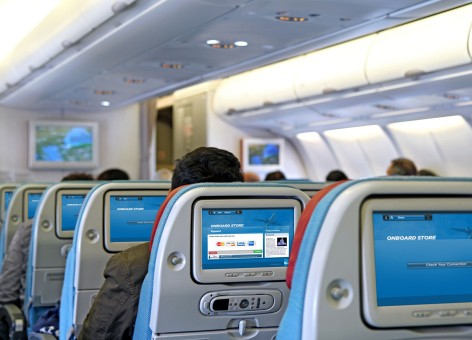Mobile Tech’s Impact On Travel Retail Yet To Come, Says GuestLogix

GuestLogix, a Canadian provider of onboard retail technology, has just released a report called “Ready For Departure: Mobile, Retail and Technology’s Impact On Airline Revenues in 2014”.Air travel has changed, in the span of a single generation, from an event for which family members used to dress slightly better than usual, because they were about to fly on an airplane, into a tedious process distinguished mainly by boredom, humiliation and squalor.
If there is one aspect of modern life that might be dramatically improved through the application of the design concept of “user experience”, flight is it.
GuestLogix, a Canadian provider of onboard retail technology, has just released a report called “Ready For Departure: Mobile, Retail and Technology’s Impact On Airline Revenues in 2014”, which anatomizes the problem while suggesting the shape of customer air travel experience to come.
Cantech Letter spoke with Ilia Kostov, GuestLogix’s Executive Vice President for Global Sales and Product Strategy, by phone from Dallas. “How did flying become less pleasant than riding public transit?” I ask. The advent of low-cost carriers during the 1990s provoked established airlines to compete with the monetization of previously “free” perks, such as pillows, snacks, baggage check-in and Wi-fi. This race for the bottom has led to an airline industry that sees profit margins not much higher than the grocery business.
When you take a look at the ancillary revenues for airlines, from the more traditional services like baggage fees, etc., you see that they have plateaued. The growth in ancillary revenues is now from services that are perceived by passengers as adding real value and something that they desire, something that they want.
Kostov says the way forward lies in the improvement of the customer experience through use of onboard technology and passengers’ mobile devices. “When you take a look at the ancillary revenues for airlines, from the more traditional services like baggage fees, etc., you see that they have plateaued, right? So there’s not that much growth left in revenue streams from those kinds of fees. But where we see a lot of opportunity and where we see the growth in ancillary revenues is now from services that are perceived by passengers as adding real value and something that they desire, something that they want.”
Mobile commerce, which partly owes its popularity to the renegade practice of “showrooming”, drove approximately $25 billion dollars in spending in 2013. But comparable revenue streams have yet to appear in the travel retail market.
So, with seemingly no room left to innovate now that every ancillary revenue source has been offloaded to the customer, the only way to at least make air travel borderline pleasant again is to improve how people actually experience it through customer service. The GuestLogix report, written by CEO Brett Proud, surmises that this will be accomplished through a combination of self-service personalization, mobile commerce and business intelligence, facilitated by smart phones, data analytics and “smart” kiosks.
With the FAA relaxing the use of personal devices now on board, effectively an airline can have their store open for the entire duration of the flight.
Key to the development of seamless optimization of ancillary revenues will be the concurrent rise of the mobile wallet, already fueled by the eagerness of other retail sectors to hurry the process along. Another milestone is the pending relaxation of regulations around in-cabin use of mobile devices. Kostov concurs, “With the FAA relaxing the use of personal devices now on board, effectively an airline can have their store open for the entire duration of the flight. Traditionally, the store is effectively open when a flight attendant pushes a cart up and down the aisle. Now, the moment you’re on board the airplane and you turn on your personal device, you can connect to the airline Wi-fi network, or if they’re using built in seat-back in-flight entertainment systems, you can start using it the moment you are in your seat.”
The combination of “smart” kiosks, mobile point-of-sale devices, smart phones and tablets with in-flight screens that can also double as entertainment systems promises to consolidate what previously were separate tasks. A traveller can use their phone to book concert tickets in the city they’re travelling to from the seat back in front of them.
Aside from merely streamlining the process of ticket purchase, check-in and buying stuff during the flight, equally important from the retailer’s perspective will be data analytics, in order to create a customizable portrait of each customer’s use and behaviour patterns. “Whether it’s coming from their own personal preferences, or whether it’s coming from the use of analytics and past behaviours, etc., you have technology working both off-board as well as on-board that can serve those relevant offerings to them,” says Kostov. “Also, obviously with smartphone tablets and even with in-flight entertainment systems, the technology is here that you can do your marketing in a variety of different ways.”
I asked Kostov how GuestLogix’s recently cemented deal with an unnamed European railway company to handle point-of-sale technology for transactions at ticket kiosks as well as on board the train is informing their overall strategy in casting their net wider than air travel retail tech. Guestlogix’s Kostov: “I see a lot of what happened with banking on the ground, a lot of what happened with travel on the ground as well, and retailing on the ground, to effectively happen on board as well in the next five years, where you have this omni-channel storefront, multiple ways to reach the consumer, and you have the technology to personalize the service as well.”
“There are certain trends and developments in the rail space that benefit our airline customers,” Kostov replies. “For example, the rail operators have had ubiquitous access to real-time connectivity for a while. And that allows our technology to tap in to real-time analytics, into real-time passenger profiles, but also allows us to offer the operators real-time inventory control, inventory management processes, so they know what’s selling, what’s not selling. It costs money to fly or move merchandise, physical inventory that doesn’t sell. That costs money, it costs fuel burn, it costs people moving on and off trains and airplanes, etc. So being able to make those kinds of real-time decisions and using real-time connectivity is something that we can leverage from the rail segment into the airline segment.”
GuestLogix recently reported that its Global Payment Gateway has recovered more than $1 million in declined and/or fraudulent credit card payments. I ask Kostov to describe how this process works.
“GuestLogix has developed a payment technology that affords several different ways to effectively and virtually eliminate declined credit card transactions,” he replies. “It starts with card validation upon the point of sale, whether that’s a chip-and-pin card or any other card. It starts with card validation on point of sale. It goes into the use of lists to make sure that cards that are being used on board are run against a predetermined blacklist or hotlist that does not allow certain cards to be used.”
One point in GuestLogix’s Global Travel report particularly intrigued me. Brett Proud writes that mobile optimization and the airline’s ability to personalize data will make “traditional distinctions like first class, business class and coach meaningless.” I can’t resist asking Kostov for his take on what sounds potentially like a determination to eliminate class distinctions in the friendly skies.
“Traditionally, the airlines would say: First, Business, Coach. And the experience in coach is the same for everybody. Well, it doesn’t have to be,” he says. “With technology, and we have airlines doing this today, you can personalize the experience for everybody, including the passengers sitting in coach. So you can greet them by name, or if you want to start differentiating where you greet your most frequent travellers and your most valued passengers, and also thank them for their business, you could do that as well. So that’s really, in my mind, what’s behind that statement, is that the technology is here, where you can do so much more for the customer service and the customer experience than the traditional First, Business, Coach differentiator.”
As for the future, Kostov does not see the new technology as a “robots took our jobs” game changer for flight attendants. ”Just like with our regular retail experience or our banking experience, you have ATMs which are self-service, you have mobile banking on your smartphone, you have web banking, and then you have tellers as well,” he says.
“I see a lot of what happened with banking on the ground, a lot of what happened with travel on the ground as well, and retailing on the ground, to effectively happen on board as well in the next five years, where you have this omni-channel storefront, multiple ways to reach the consumer, and you have the technology to personalize the service as well.”
Done right, the improvement of air passengers’ real-life user experience can cement loyalty over the long-term, which typically leads to higher revenues over the lifetime of that relationship than would otherwise happen through a purely ad hoc approach that makes no attempt at fostering loyalty. Such a relationship is more likely to grow if a retailer is able to supply the kind of personalized offers that are only achievable through a combination of analytics and mobile technology, along with customer engagement.
_____________________________________________________________________________________________________________________

Terry Dawes
Writer


